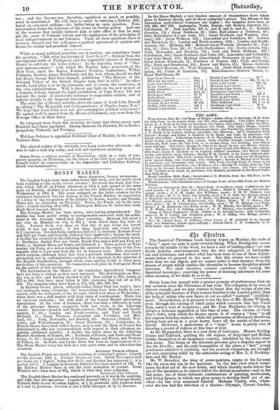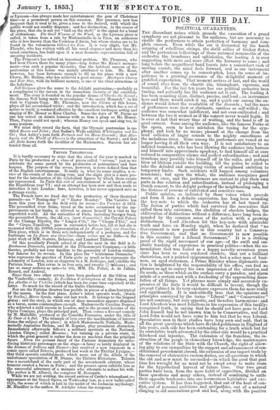Drury Lane has opened with a greater promise of performance
than on any occasion since the Christmas of last year. The company, to be sure, is obscure enough; and we may venture to assert that the troupe of any one of the principal theatres of Paris is more familiar to the London public than the body of artists who now figure at our so-called "national" establish- ment. Nevertheless, it is pleasant to see the face of Mr. Henry Waller*, even_ through the coating of black paint which converts him into Uncle Tom, amid a host of neophytes; and Mr. Tom Matthews, the Clown, is always a welcome apparition at this time of year. The version of Uncle Tom's Cabin, with which the theatre opens, is of course a " bone " to all but express holydap-makers; while the pantomime of Harlequin..Hudibras, having been got up in a great hurry, bears all the marks of that pecu- liarity. However, a pantomime at a "large" holm is pretty sure of drawing a crowd of visitors at this time of year. At the Haymarket, there is a new form of burlesque. Messrs. Stirling Coyne and Talfourd, quitting the old regions of fairy-land and Hellee, betake themselves to an imaginary country, inhabited by the brute crea- tion alone. The forma of the dramatis persona) give a singular aspect to Leo the Terrible; and the only humanities of the piece, a " fast " young gentleman addicted to yachting, and his nautical companion, are brought out into surprising relief by the admirable acting of Mrs. L. S. Bucking- ham and Mr. It eeley. Mr. W. Beverley, the king of scene-paintets, reigns at the Lyceum like the noon-day sun in the meridian. In the lake view which termi.- nates the first act of the new feerie, and which literally melts before the eye of the spectator as he tries to follow the distant mountains-and in the last scene, one of those elaborate combinations of painting, mechanism, and living figures, in which one glory seems to develop itself o'ut of an- other-he has even surpassed himself. Madame Vestris, who, when- ever she has had the direction of a theatre-Olympic, Covent Garden, iJanuary 1, 1853.]
or Lyceum—has always made her entertainment the gem of Christmas time—is a prominent person on this occasion. Her presence, now less frequent than it used to be, gives a tone to the festival, with which the public would not readily dispense ; and her declaration, in the course of the piece, that she is not yet "laid on the shelf," is the signal for a burst of enthusiasm. The Good Woman of the Wood, as the Lyceum piece is called, is taken from a tale by Mademoiselle de la Thee, an authoress who is less known than the Countess d'Anois, but whose stories are to be found in the voluminous Cabinet des Fees. It is very slight, but Mr. Planche, who has written with all his usual elegance and more than his usual smartness, has built upon it a neat dramatic representation full of amusing incidents. The Princess's has solved an important problem. Mr. Flexmore, who had been Clown there for many years—long before Mr. Kean's manage- ment—was such a popular favourite, that the habitual success of the pantomime at this house was mainly attributed to him. Mr. Kean, however, has been fortunate enough to 811 up his place with a new Clown, Mr. Huline, who has achieved a good success : Harlequin Cherry • and Fair Star, with its brilliant scenery, is one of the chief attractions of the holydays. Gwynne gives the name to the Adelphi pantomime,—probably as a compliment to the tavern in the immediate vicinity of the establish- ment. The story is founded on the popular drama of Charles the Second; the famous Nell being made to accompany "the merry Monarch" in his visit to Captain Copp. Mr. Flexmore, now the Clown at this house, plays all his accustomed tricks ; and the introduction, which has a set of actors to itself, is rendered effective by the excellent burlesque acting and singing of Mr. Honey as King Charles. Since the days of W..Payne no one has seized on mimic humour with so firm a grasp as Mr. Honey. Then, Payne could not speak; whereas Honey can speak and sing too, to some purpose.
We must drily record the facts, that the Olympic pantomime is en- titled Romeo and lutist; that Sadler's Wells exhibits Whittington and his Cat; that Astley's puts forth Fortunio and his Horse Conrade ; that Har- lequin and the World of Flowers is the attraction of the Surrey ; and that Ali Baba draws forth the faculties of the Marionettes. Success has at- tended them all.

































 Previous page
Previous page